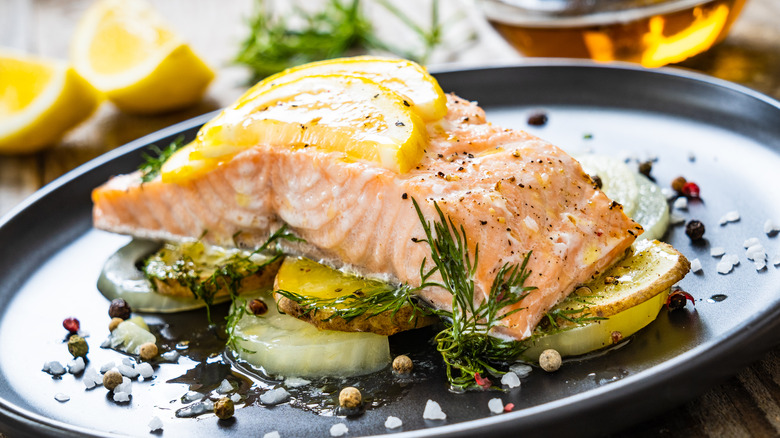Ina Garten's Pro Tip For Preventing Bitter Roasted Lemons
Ina Garten knows a thing or two about roasted chicken, calling it the one dish she couldn't live without and making some version of it almost every Friday night for her and her husband, Jeffrey. Often she'll add whole lemon slices next to, inside, or underneath the chicken to infuse the tender meat with amazing flavor.
Recently, however, a fan trying Ina's Skillet Roasted Lemon Chicken recipe found that the roasted lemons turned bitter. And they took to the Ask Ina section of The Barefoot Contessa's website to get advice on how to avoid this from happening in the future. Garten answered, noting that the lemon slices need to be no more than 1/4-inch thick for a very important reason. "As the lemon slices cook, they break down and caramelize, but it's important that they be sliced very thin," she explained.
Whole lemon slices include the pith, the spongy white part of the lemon, which tends to be bitter in flavor. With thinner lemon slices, the juices of the cooking chicken can soak into the pith quicker, leaving it infused with flavor rather than raw and bitter.
How to choose lemons to avoid bitterness
One way to follow Ina Garten's tip and slice lemons thin enough is to use a mandolin, which will cut the citrus into super narrow pieces while also keeping the slices even. If you're still running into problems, you might have another issue. While slicing the lemons very thin is one way to eliminate any off-putting bitterness, this trick might not work if the lemon has a very thick pith.
If you are making a dish using a whole lemon, it could be worth seeking out fruit with thinner skins and consequently thinner rinds. To find this kind in a typical supermarket, look for smooth lemons, which tend to have thinner skins and thus less pith to contend with. They will also have more juice, which might help with caramelization.
You could also look for specific varieties of lemons that have thinner skins like Eureka or Meyer. Eureka might be harder to identify because they aren't typically labeled in grocery stores, but Meyer varieties should be. They have a slightly orange tinge and are sweeter with thin skins that will be less bitter than traditional lemons.
More ways to avoid bitterness when cooking with lemons
There are a few other ways to harness the wonderful acidity of whole lemon slices without adding bitterness to your dish. Another benefit to using thin-skinned lemons is that they tend to have fewer seeds, a component that will lend a bitter bite. Be sure to remove the seeds if you are using whole slices of the citrus or fish them out before cooking if they happen to fall inside the pan. Another pro tip is to blanch the lemon slices in boiling water for a minute and then move them to an ice water bath; this will remove some of the bitterness if the pith is particularly thick.
Once you've found your go-to trick, expand your use of lemon beyond roasted chicken dishes. Try grilling chicken or fish on top of a bed of lemons to add amazing flavor. Lemon slices can also make your fish taste so much better when laid on top of a filet or stuffed inside before grilling or baking. Try lemon slices in vegetable dishes, too! Roasted baby red potatoes with lemon and bay leaves combine for a truly unique side dish and fried lemon slices will transform any salad.


